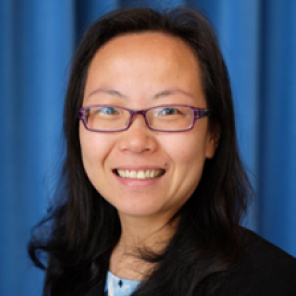
Over the span of more than 10 years, I have dedicated my professional career to improving the oral health of children, driven by a passion for promoting well-being and fostering bright smiles for the future.
In March 2023, I joined the University of California, Los Angeles (UCLA) School of Dentistry as an adjunct assistant professor in Public and Population Health within the Division of Oral and Systemic Health Sciences.
I am thrilled to be a part of the school's academic community and I look forward to contributing to its mission of advancing oral health research and education. My goal is to specialize in analytical and translational microbiome research with a focus on the early life establishment and development of the oral microbiome among children.
Please briefly describe your background and research interests.
I earned my undergraduate degree in Mathematics and also double-majored in Computer Science. In 2019, I received my PhD in Biostatistics. I completed a one-year T37 NIMHD postdoc training from 2019 to 2020 at the School of Public Health, Drexel University, followed by a two-year T32 NIMH postdoc training from 2020 to 2022 at the Division of Infectious Diseases, David Geffen School of Medicine, UCLA.
I am committed to advancing the understanding of longitudinal oral microbiome data and its association with dental diseases and systemic health. My long-term vision is to understand the patterns and dynamics of the oral microbiome during early life stages that may have long-term consequences for a child’s oral and systemic health.
How did you first learn about the AADOCR Mind the Future Program, and what motivated you to apply?
I had the pleasure of attending the AADOCR meeting in March 2023, where I presented as an early career investigator in the oral epidemiology forum. I also chaired and presented at the section of Prevalence of Oral Diseases and Risk Factors. At the faculty development workshop, I learned about the MIND the Future program and was impressed by the accomplishments of previous cohorts. I am thrilled about the opportunity to participate in this program, as I believe it will enhance my research expertise and facilitate the expansion of my collaborative research with dental professionals.
What has been the most valuable benefit of AADOCR membership to you?
The AADOCR provides a platform to enhance my collaborative research in oral health and expand my research network, both with my mentors and my peers. Their mission of advocating for oral health research and dental education in Washington DC aligns with my mission as a faculty member in the school of dentistry. They also offer a platform during the conference for researchers to connect with funding officers from NIDCR. This allows for in-person meetings to understand and discuss funding opportunities. This is such an important organization for dental researchers. I've decided to run for the Southern California Vice President position for 2024 to service the community.
What is the best way for other members to become more involved in AADOCR and get the most out of the membership?
I think the best approach would be for the AADOCR to provide more networking opportunities that mix students, junior faculty, leading experts, and program officers. What we take home is not only the cutting-edge research but also memories with our friends and colleagues. We shared many stories together during the conference, especially after the pandemic. The AADOCR conference gathered us together in person to share research progress, brainstorm ideas, career challenges, and make lifelong friends. All these memories motivate us to move forward with our research careers.




